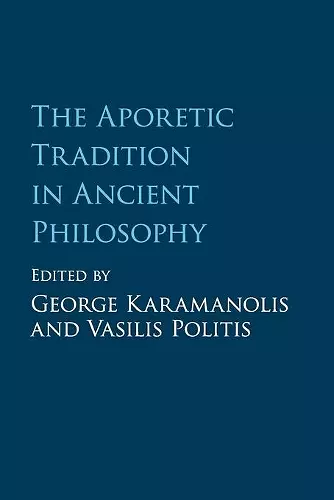The Aporetic Tradition in Ancient Philosophy
Vasilis Politis editor George Karamanolis editor
Format:Paperback
Publisher:Cambridge University Press
Published:22nd Aug '19
Currently unavailable, and unfortunately no date known when it will be back
This paperback is available in another edition too:
- Hardback£94.00(9781107110151)

The first comprehensive study of the function and value of aporia, or puzzlement, as a key tool in ancient philosophical enquiry.
This is the first comprehensive study of the method, source, and aims of aporia in ancient philosophy, examining how diverse philosophers (including Plato, Aristotle, Plutarch, the Sceptics, and Plotinus) used the state of puzzlement, rooted in conflicts of reasons, as a central tool in philosophical enquiry.Ancient philosophers from an otherwise diverse range of traditions were connected by their shared use of aporia - translated as puzzlement rooted in conflicts of reasons - as a core tool in philosophical enquiry. The essays in this volume provide the first comprehensive study of aporetic methodology among numerous major figures and influential schools, including the Presocratics, Plato, Aristotle, Plutarch, Alexander of Aphrodisias, Academic sceptics, Pyrrhonian sceptics, Plotinus and Damascius. They explore the differences and similarities in these philosophers' approaches to the source, structure, and aim of aporia, their views on its function and value, and ideas about the proper means of generating such a state among thinkers who were often otherwise opposed in their overall philosophical orientation. Discussing issues of method, dialectic, and knowledge, the volume will appeal to those interested in ancient philosophy and in philosophical enquiry more generally.
'Questions … are raised and answered in a surprisingly diverse, yet unified series of studies.' Lloyd Gerson, Journal of the History of Philosophy
ISBN: 9781107526631
Dimensions: 229mm x 150mm x 17mm
Weight: 350g
327 pages